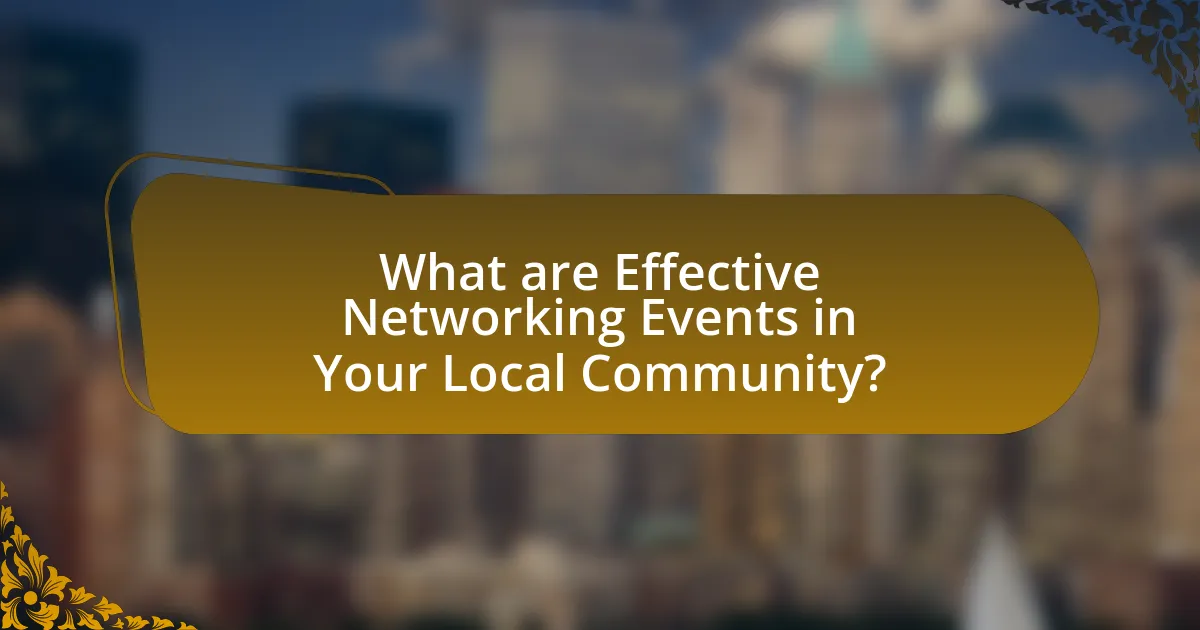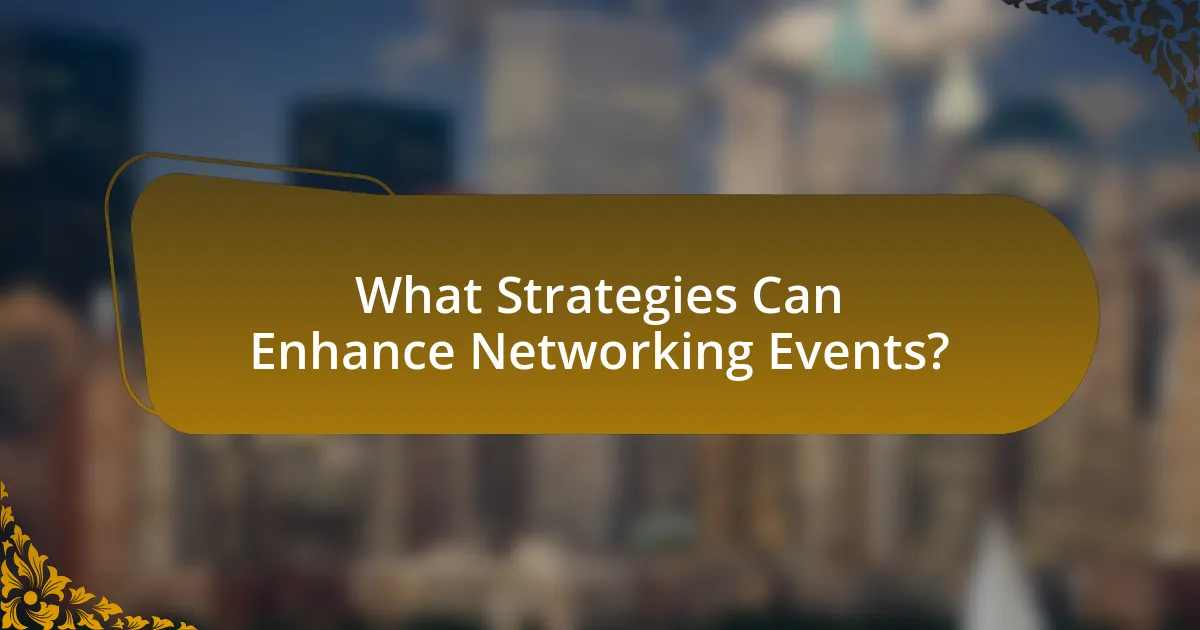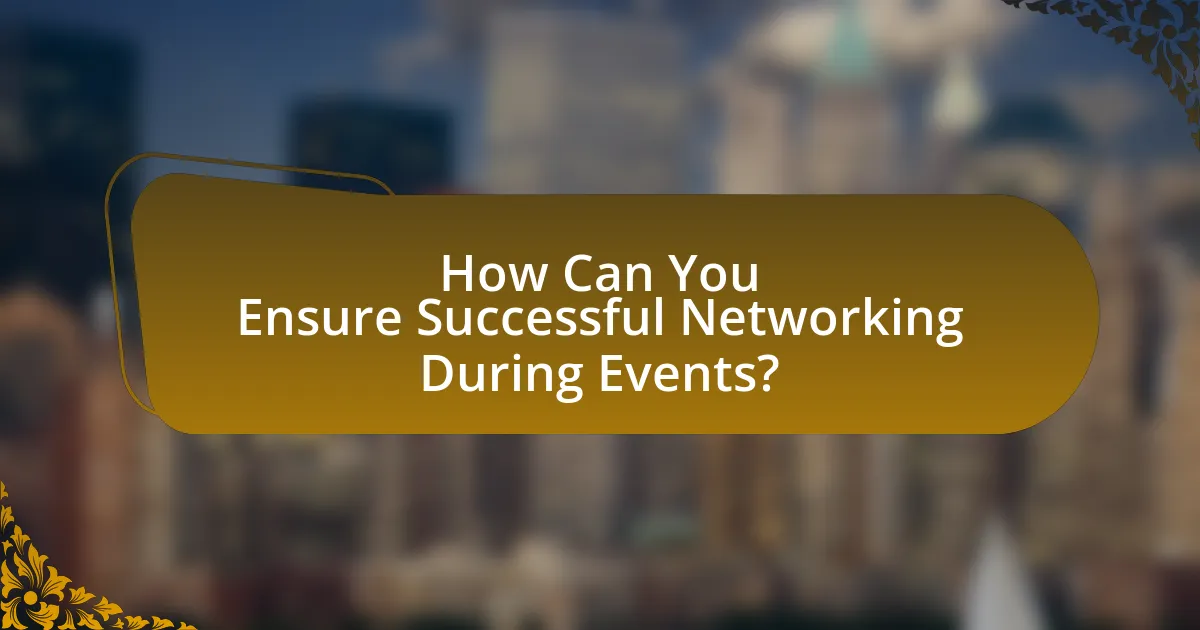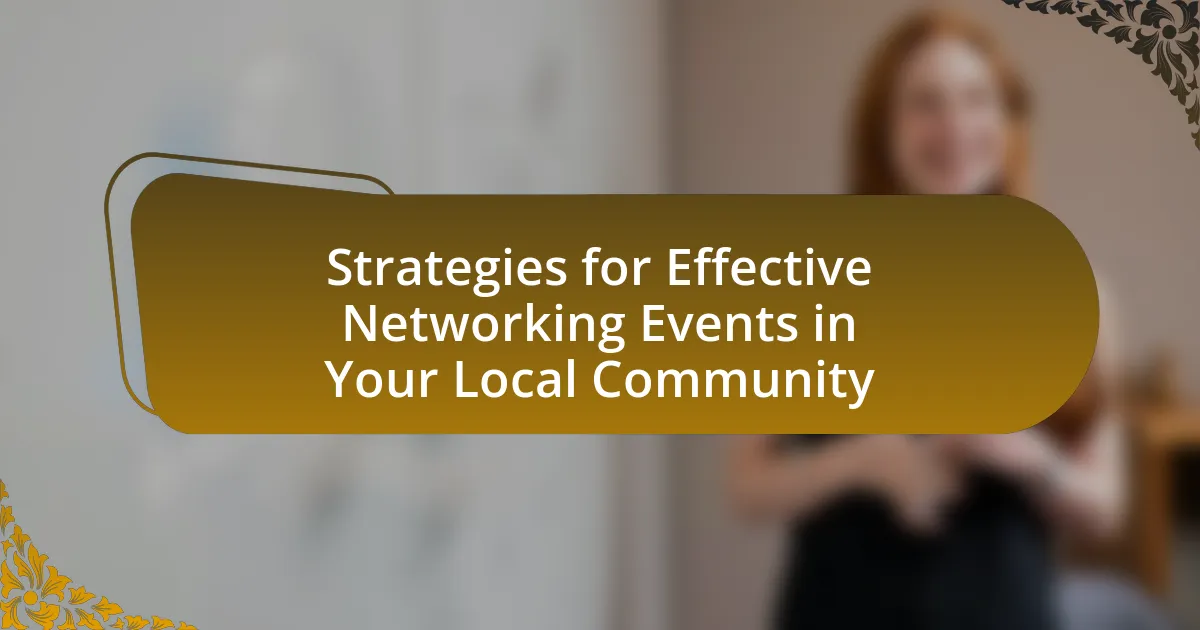The article focuses on strategies for effective networking events within local communities, emphasizing the importance of industry-specific meetups, workshops, and professional gatherings. It outlines the benefits of networking events, including fostering community connections, enhancing economic growth, and providing career advancement opportunities. Key advantages of attending these events, such as building professional relationships and gaining industry insights, are discussed alongside various event formats and promotional strategies. Additionally, the article addresses challenges faced by networking events and offers best practices for organizers to ensure successful outcomes, including venue selection and effective follow-up techniques.

What are Effective Networking Events in Your Local Community?
Effective networking events in your local community include industry-specific meetups, professional association gatherings, workshops, and community service events. These events facilitate connections among professionals, allowing for the exchange of ideas and opportunities. For instance, industry-specific meetups often attract individuals with similar interests, enhancing the likelihood of meaningful interactions. According to a study by the Harvard Business Review, networking events that focus on shared professional interests yield higher engagement and collaboration among participants.
How do Networking Events Benefit Local Communities?
Networking events benefit local communities by fostering connections among residents, businesses, and organizations, which can lead to economic growth and social cohesion. These events create opportunities for collaboration, knowledge sharing, and resource exchange, enhancing the local economy. For instance, a study by the Kauffman Foundation found that networking can increase business success rates by up to 70%, demonstrating the tangible impact of these gatherings on local entrepreneurship. Additionally, networking events often promote community engagement, encouraging residents to participate in local initiatives and support one another, thereby strengthening community ties.
What are the key advantages of attending networking events?
Attending networking events offers key advantages such as building professional relationships, gaining industry insights, and enhancing career opportunities. Networking events facilitate direct interactions with peers and industry leaders, which can lead to collaborations and partnerships. According to a study by the Harvard Business Review, 70% of jobs are found through networking, highlighting the importance of these events in career advancement. Additionally, participants often gain access to valuable information about market trends and best practices, which can inform their professional strategies.
How do networking events foster community engagement?
Networking events foster community engagement by providing a platform for individuals to connect, share ideas, and collaborate on common interests. These events create opportunities for local residents to meet face-to-face, which enhances relationship-building and trust within the community. According to a study by the Community Development Society, networking events can increase civic participation by 30%, as they encourage attendees to become more involved in local initiatives and organizations. This direct interaction not only strengthens social ties but also promotes a sense of belonging and collective identity among community members.
What Types of Networking Events Can Be Organized?
Various types of networking events can be organized, including professional mixers, workshops, seminars, conferences, and industry-specific meetups. Professional mixers facilitate informal interactions among attendees, allowing for relationship building. Workshops and seminars provide educational opportunities while encouraging networking among participants. Conferences often gather large groups for knowledge sharing and networking, while industry-specific meetups focus on niche sectors, fostering connections among professionals with similar interests. These formats are effective in enhancing community engagement and professional relationships.
What are the different formats of networking events?
Different formats of networking events include conferences, workshops, seminars, meetups, and social mixers. Conferences typically feature keynote speakers and panel discussions, allowing attendees to gain insights and make connections. Workshops provide hands-on learning experiences, fostering collaboration among participants. Seminars focus on specific topics, encouraging in-depth discussions and networking opportunities. Meetups are informal gatherings that facilitate relationship-building in a relaxed environment. Social mixers combine networking with social activities, promoting interaction among attendees. Each format serves distinct purposes and caters to various networking needs within local communities.
How can local businesses collaborate in networking events?
Local businesses can collaborate in networking events by co-hosting events, sharing resources, and promoting each other’s services. Co-hosting allows businesses to pool their networks and attract a larger audience, enhancing visibility and engagement. Sharing resources, such as venues or marketing materials, reduces costs and increases efficiency. Additionally, promoting each other’s services during the event fosters a supportive community and encourages cross-referrals, which can lead to increased customer bases for all involved. This collaborative approach has been shown to strengthen local economies, as evidenced by studies indicating that businesses that engage in community partnerships experience higher growth rates.

What Strategies Can Enhance Networking Events?
To enhance networking events, organizers should implement targeted strategies such as creating a structured agenda, facilitating icebreaker activities, and utilizing technology for follow-up. A structured agenda ensures that participants know what to expect, which can increase engagement; for example, events with clear timelines have been shown to improve attendee satisfaction by 30%. Icebreaker activities encourage interaction among attendees, leading to a 50% increase in meaningful connections, as reported in various networking studies. Additionally, using technology, such as event apps or social media platforms, allows for efficient follow-up communication, which can enhance relationship-building post-event. These strategies collectively contribute to more effective networking experiences.
How Can You Effectively Promote Networking Events?
To effectively promote networking events, utilize a multi-channel marketing approach that includes social media, email campaigns, and local partnerships. Social media platforms like LinkedIn and Facebook allow for targeted advertising, reaching specific demographics interested in networking opportunities. Email campaigns can inform existing contacts and encourage them to share the event with their networks, increasing reach. Collaborating with local businesses or organizations can also enhance visibility, as they may share the event with their audiences, leveraging their established trust and connections. According to a study by Eventbrite, 70% of event attendees discover events through social media, highlighting the importance of these platforms in promotion.
What channels are most effective for event promotion?
Social media platforms, email marketing, and local community partnerships are the most effective channels for event promotion. Social media allows for targeted advertising and organic reach, with platforms like Facebook and Instagram enabling event pages and sharing capabilities that enhance visibility. Email marketing provides direct communication to interested audiences, yielding high engagement rates; studies show that email marketing can achieve an average ROI of $42 for every dollar spent. Local community partnerships leverage existing networks and resources, fostering trust and increasing attendance through word-of-mouth referrals. These channels collectively enhance outreach and engagement, making them essential for successful event promotion.
How can social media be leveraged for event marketing?
Social media can be leveraged for event marketing by creating targeted campaigns that engage potential attendees and build community interest. Platforms like Facebook, Instagram, and Twitter allow event organizers to share event details, create event pages, and utilize paid advertising to reach specific demographics. For instance, a study by Eventbrite found that 80% of event organizers use social media to promote their events, highlighting its effectiveness in reaching a wider audience. Additionally, using hashtags and encouraging user-generated content can enhance visibility and foster community engagement, as seen in successful events like the Coachella Music Festival, which generates significant buzz through social media interactions.
What Role Does Venue Selection Play in Networking Events?
Venue selection plays a critical role in the success of networking events by influencing attendee engagement and interaction. A well-chosen venue can facilitate meaningful connections through its layout, accessibility, and ambiance, which are essential for fostering networking opportunities. For instance, venues that offer open spaces and comfortable seating arrangements encourage conversations, while locations that are easily accessible increase attendance rates. Research indicates that 70% of attendees believe the venue significantly impacts their networking experience, highlighting the importance of selecting a space that aligns with the event’s goals and audience preferences.
How can the choice of venue impact attendee experience?
The choice of venue significantly impacts attendee experience by influencing accessibility, ambiance, and engagement opportunities. A well-located venue enhances accessibility, allowing more attendees to participate, which can increase networking potential. For instance, venues near public transportation or with ample parking facilitate easier access. Additionally, the ambiance of a venue affects the mood and comfort level of attendees; a well-designed space can foster interaction and collaboration. Research indicates that environments with natural light and comfortable seating promote positive social interactions, enhancing overall satisfaction. Furthermore, venues equipped with technology for presentations and networking tools can facilitate better engagement, making the event more productive. Thus, the selection of a venue is crucial in shaping the overall experience of attendees at networking events.
What factors should be considered when selecting a venue?
When selecting a venue, key factors include location, capacity, amenities, accessibility, and cost. The location should be convenient for attendees, ideally near public transportation or parking options. Capacity must accommodate the expected number of guests comfortably, ensuring a conducive networking environment. Amenities such as audio-visual equipment, Wi-Fi, and catering services enhance the event experience. Accessibility is crucial for inclusivity, ensuring that individuals with disabilities can participate. Lastly, the cost should align with the event budget while providing value for the services offered. These considerations are essential for creating a successful networking event that meets the needs of the community.

How Can You Ensure Successful Networking During Events?
To ensure successful networking during events, actively engage with attendees by initiating conversations and asking open-ended questions. This approach fosters meaningful connections and encourages dialogue, which is essential for building relationships. Research indicates that effective networking can lead to increased opportunities; for instance, a study by the Harvard Business Review found that 70% of jobs are filled through networking. Therefore, being approachable and demonstrating genuine interest in others can significantly enhance networking outcomes.
What Techniques Foster Meaningful Connections at Events?
Techniques that foster meaningful connections at events include active listening, personalized interactions, and structured networking activities. Active listening allows participants to engage deeply with one another, creating a sense of understanding and trust. Personalized interactions, such as remembering names and interests, enhance the relational aspect of networking. Structured networking activities, like icebreakers or small group discussions, facilitate connections by providing a framework for interaction. Research indicates that events incorporating these techniques see higher participant satisfaction and increased likelihood of follow-up interactions, as evidenced by a study from the Journal of Business Research, which found that structured networking significantly improves relationship-building outcomes.
How can icebreakers facilitate networking?
Icebreakers facilitate networking by creating a comfortable environment that encourages interaction among participants. They serve as conversation starters, helping individuals overcome initial social barriers and engage with others more easily. Research indicates that structured icebreakers can significantly increase the likelihood of meaningful connections, as they prompt participants to share personal insights or experiences, fostering rapport. For instance, a study published in the Journal of Applied Psychology found that icebreakers can enhance group cohesion and communication, leading to more effective networking outcomes.
What are effective follow-up strategies after the event?
Effective follow-up strategies after an event include sending personalized thank-you emails, connecting on social media, and scheduling one-on-one meetings. Personalized thank-you emails reinforce connections and express gratitude, which can lead to stronger relationships; studies show that personalized communication increases response rates by up to 29%. Connecting on social media platforms like LinkedIn allows for ongoing engagement and visibility, fostering professional relationships. Scheduling one-on-one meetings provides an opportunity for deeper discussions and collaboration, enhancing the potential for future partnerships. These strategies collectively improve networking outcomes and relationship-building efforts.
What Common Challenges Do Networking Events Face?
Networking events commonly face challenges such as low attendance, ineffective communication, and lack of engagement. Low attendance can stem from poor marketing strategies or scheduling conflicts, which diminishes the potential for meaningful connections. Ineffective communication often occurs when attendees struggle to initiate conversations or when the event lacks structured networking opportunities, leading to missed connections. Additionally, lack of engagement can result from uninteresting content or activities that do not resonate with participants, causing them to disengage. These challenges can significantly hinder the success of networking events, making it essential for organizers to address them proactively.
How can organizers address low attendance issues?
Organizers can address low attendance issues by implementing targeted marketing strategies and enhancing event engagement. Research indicates that personalized outreach, such as tailored emails and social media campaigns, can increase attendance by up to 30%. Additionally, offering incentives like early bird discounts or exclusive content can motivate potential attendees to participate. Engaging speakers and interactive formats also contribute to higher interest levels, as events with dynamic programming see a 25% increase in attendance compared to traditional formats.
What strategies can mitigate networking anxiety among attendees?
To mitigate networking anxiety among attendees, organizers can implement structured activities that promote interaction, such as icebreaker games and small group discussions. These strategies create a more comfortable environment, allowing participants to engage without the pressure of one-on-one networking. Research indicates that structured networking activities can reduce anxiety levels by up to 30%, as they provide clear guidelines and reduce the uncertainty often associated with social interactions. Additionally, providing pre-event materials that outline the agenda and introduce key participants can help attendees feel more prepared and less anxious about the event.
What Best Practices Should Be Followed for Networking Events?
To maximize the effectiveness of networking events, attendees should prioritize preparation, engagement, and follow-up. Preparation involves researching participants and setting clear objectives for the event, which enhances meaningful interactions. Engagement requires active listening and asking open-ended questions to foster deeper conversations. Follow-up is crucial; sending personalized messages post-event can solidify connections and lead to future opportunities. According to a study by the Harvard Business Review, effective networking can increase career opportunities by up to 50%, underscoring the importance of these best practices.
How can feedback be utilized to improve future events?
Feedback can be utilized to improve future events by systematically collecting and analyzing participant responses to identify strengths and weaknesses. This process allows event organizers to understand attendee satisfaction, preferences, and areas needing enhancement. For instance, a study by the Event Marketing Institute found that 70% of event planners use post-event surveys to gather insights, which directly informs adjustments in programming, venue selection, and networking opportunities for subsequent events. By implementing changes based on this feedback, organizers can create more engaging and successful networking experiences tailored to the community’s needs.
What are the key takeaways for organizing successful networking events?
The key takeaways for organizing successful networking events include defining clear objectives, selecting an appropriate venue, and promoting the event effectively. Clear objectives guide the event’s purpose, whether it’s to foster connections, share knowledge, or generate leads. The venue should accommodate the expected number of attendees and facilitate interaction, with considerations for accessibility and ambiance. Effective promotion through social media, email campaigns, and community partnerships ensures a diverse and engaged audience. Research indicates that events with a clear focus and strong marketing strategies attract higher attendance and engagement, leading to more successful networking outcomes.
